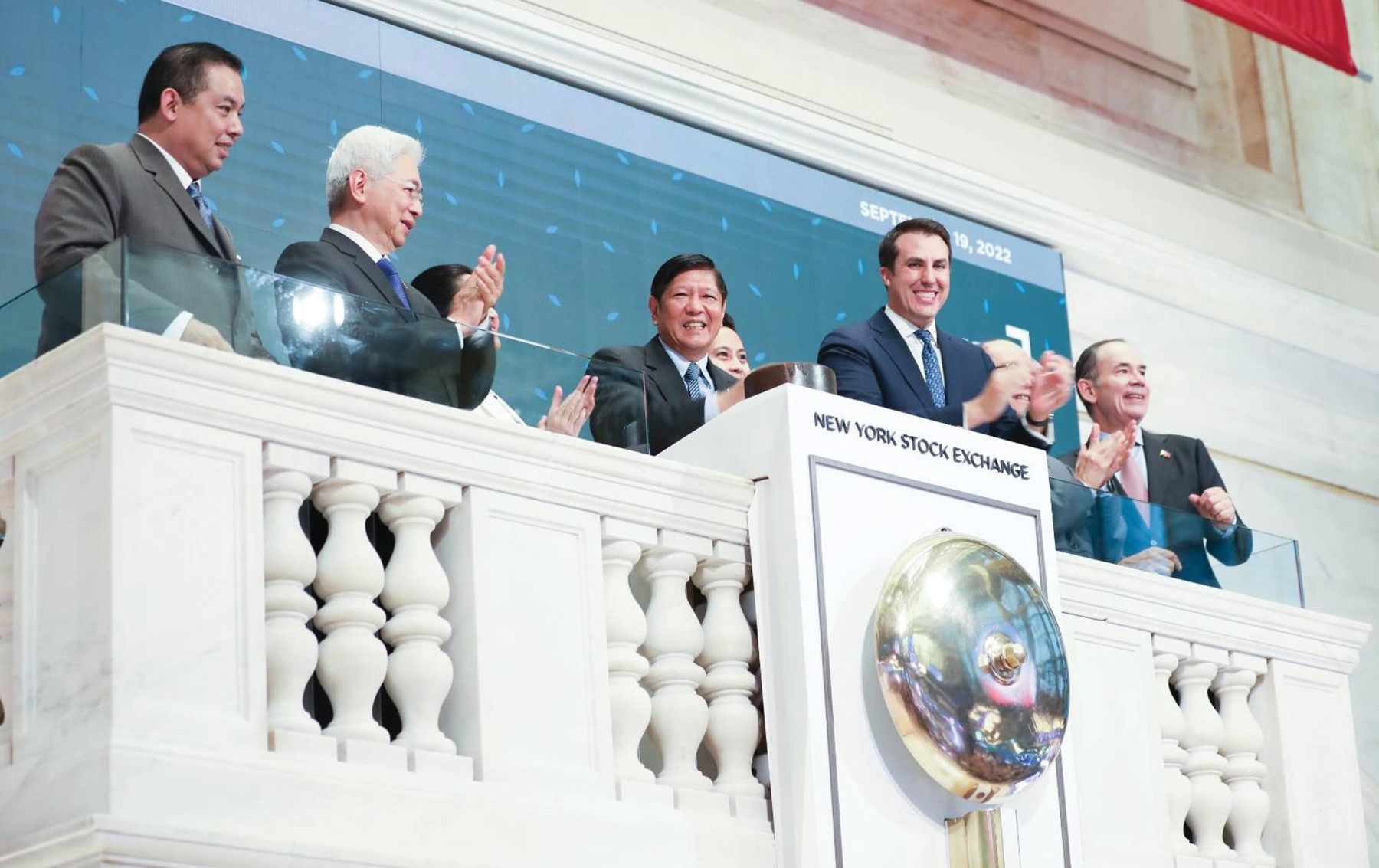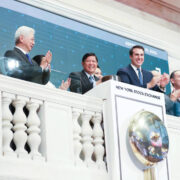
President Ferdinand Marcos, Jr. is looking forward to a strengthened relationship with the United States and emphasized that this is necessary in a time of global economic and geopolitical crisis.
“It is very clear to me, in my vision for the way that the country will move forward. I cannot see the Philippines in the future without having the United States as a partner,” Marcos told NYSE vice chair and chief commercial officer John Tuttle in a Q-and-A after his speech. “Many of the strongest corporate benefactors, really, to government and to the rest of society in the Philippines were coming from the United States.”
The president said that it is “extremely necessary” to strengthen the alliance between the United States and the Philippines because this partnership “provides the stability in these highly unstable economic, political, geopolitical, diplomatic environment.”
The United States is the third largest trading partner of the Philippines and the second major source of foreign direct investment applications in 2021.
Marcos rang the closing bell at the NYSE after the speech and interview with Tuttle. He was accompanied by his wife Liza Araneta-Marcos and their son, Rep. Sandro Marcos, and some of the economic managers he brought as part of his delegation.
“We are all thrilled to be here. We are familiar with the NYSE and the bell and that most important balcony in the world. We had always watched it from afar, so to have that opportunity to be here personally has been a great opportunity and a great pleasure,” he said.
Marcos delivered a speech at the New York Stock Exchange on Monday, Sept. 19, and called on investors to look into the Philippines, which offers high-quality labor, a large consumer market, and a wide range of fiscal and non-fiscal incentives.
In his speech, Marcos touted the economic advancements his administration has made, including the steps they have put in place to open up the country’s economy.
“Bouncing back from the pandemic, the Philippine economy has seen robust growth since last year, and as returned to its path toward upper middle-income country status. achievable we believe within the next few years,” he said.
Marcos mentioned that they enacted policies “to further liberalize our economy and welcome more foreign investment to our shores.”
This includes passing legislation to lower corporate income tax rates and rationalized fiscal incentives. The government has also reduced the minimum paid-up capital requirements for foreign retailers and foreign startups bringing in advanced new technology.
Marcos also announced that the Philippines now allows full foreign ownership of companies providing public services such as telecommunications, shipping, air carriers, railways, subways, airports, and toll roads.
Community gathering
The president and his delegation arrived at the Newark Airport aboard a chartered Philippine Airlines flight on Sunday afternoon. He began his six-day working visit in New York with his first community gathering with hundreds of Filipinos and Filipino Americans at the New Jersey Performing Arts Center.
Chants of ‘BBM’ and ‘Marcos Pa Rin’ filled the halls of NJPAC as Marcos was introduced.
The president shared that New York plays a special role in his life and reminisced that it was here where he met his future wife.
He said he used to live in Cherry Hill, New Jersey when he was studying at Wharton. He met Liza Araneta in court back in 1986 while he was waiting for Imelda’s case while she was visiting one of their fellow lawyers.
“More than 25 years din kaming hindi nakabalik dito,” he quipped.
Marcos then thanked the audience for their support in the recent elections.
“My profound gratitude to our kababayans here in the United States who were among the 31 million Filipinos in the Philippines and other parts of the world in giving me a resounding mandate to lead our country and our people in the next six years,” he said.
He also paid tribute to the almost 4.5 million Filipinos in the US “for the role you play and continue to play in advancing the interest of the Philippines and the Filipino people here in this part of the world.”
“We have over 10 million kababayans all over the world and as your president, I understand and know full well the significant impact of the Filipino diaspora on our motherland, especially in terms of supporting our post-pandemic economic recovery,” he said.
Dollar remittances have hit an all-time high of 34.88 billion dollars in 2021, representing a 5.1 percent increase from the 33.19 billion in 2020.
“Halos 40 porsiyento ng remittance nung 2021 ay galing dito sa America,” Marcs said. “You sent this record-breaking figure even when many of you were affected by the COVID-19 pandemic.”
Revitalization of the economy
“As we continue to search for more solutions to revitalize our beloved country it is not the time to look at the past, it is now the time to look to the future, and the future looks bright,” Marcos said as he laid out his goals and targets.
He said he expects to grow by 6.5 to 7.5 percent this year and to achieve that, the government will implement tax reforms that will be responsive to the development of the digital economy and will increase revenue collection.
He and his team are also targetting a 9 percent or single-digit poverty rate by 2028 and on top of that, the attainment of upper middle-income country status by 2024.
“We have formulated our medium-term fiscal strategy to achieve measurable medium-term macroeconomic and fiscal objectives such as 6.5 to 8 percent real GDP growth annually between 2023 and 2028,” he said.
Marcos was joined onstage by his delegation led by the First Lady Liza Marcos, their sons Rep. Sandro Marcos and Simon Marcos, House Speaker Martin Romualdez, Ambassador Babe Romualdez, Permanent Representative to the United Nations Ambassador Antonio Lagdameo Sr., Special Assistant to the President Antonio Lagdameo Jr.., and Special Envoy to UNICEF Nikki Prieto Teodoro.
Among the Cabinet secretaries present at the event were Enrique Manalo (Foreign Affairs), Manny Bonoan (Public Works and Highways), Alfredo Pascual (Trade and Industry), Christina Frasco (Tourism), Jaime Bautista (Transportation), Amenah Pangandaman (Budget and Management), Ivan John Uy (Information and Communications Technology), Susan Ople (Migrant Workers), Arsenio Balisacan (NEDA), Trixie Cruz-Angeles (Press), Maria Zenaida Amping (Presidential Management Staff), and Ben Diokno (Finance). n





